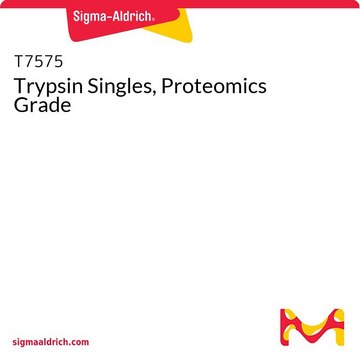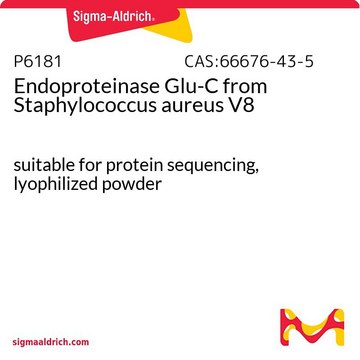EMS0008
LysargiNase
suitable for peptide or protein digestion insolution or in gel
Sinónimos:
LysargiNase mirrors trypsin for protein C-terminal and methylation-site identification
Iniciar sesiónpara Ver la Fijación de precios por contrato y de la organización
About This Item
UNSPSC Code:
41105331
NACRES:
NA.54
Productos recomendados
Categorías relacionadas
General description
LysargiNase is a metalloproteinase found in the thermophilic archaea Methanosarcina acetivorans. It specifically cleaves before lysine and arginine residues in proteins. This cleavage results in peptides with molecular weights similar to tryptic peptides, but with N-terminal lysine or arginine residues that can be fragmented with b ion-dominated spectra. This can improve protein C-terminal peptide identification and several arginine rich phosphosite assignments. Unlike with trypsin, LysargiNase cleavage also occurs at methylated lysine and arginine, allowing detection of these epigenetic modifications.
LysargiNase is suitable for peptide or protein digestion in solution or in gel.
Application
LysargiNase is suitable for peptide or protein digestion in solution or in gel.
LysargiNase is suitable for peptide or protein digestion in solution or in gel. It is active under a variety of solvent conditions including 5 mM TCEP, 5% methanol, 5% acetonitrile, 0.8 M urea, 0.1% RapiGest, 1% deoxycholate, 0.2% SDS and 1% NP-40. It is active up to 55°C at pH 6 – 9. LysargiNase is reversibly inhibited by 1, 10-phenanthroline, EDTA and other calcium and zinc chelating agents. For peptide or protein digestion, a ratio of between 1:100 to 1:20 (w/w) enzyme:substrate is recommended.
Components
Each vial contains 20 µg LysargiNase, prepared by recombinant expression in E. coli and lyophilized from buffer.
Physical form
Each vial contains 20 µg LysargiNase, prepared by recombinant expression in E. coli and lyophilized from buffer. Upon reconstitution in 20 µL water, the enzyme is in 50 mM HEPES, 5 mM CaCl2, pH 7.5.
Storage and Stability
Store the lyophilized product at -20°C for up to 2 years. After reconstitution, the unused material can be stored in the freezer in aliquots. Avoid repeated freeze thaw cycles.
Other Notes
Concentration: Please refer to lot specific datasheet.
Disclaimer
Unless otherwise stated in our catalog or other company documentation accompanying the product(s), our products are intended for research use only and are not to be used for any other purpose, which includes but is not limited to, unauthorized commercial uses, in vitro diagnostic uses, ex vivo or in vivo therapeutic uses or any type of consumption or application to humans or animals.
signalword
Danger
hcodes
Hazard Classifications
Eye Irrit. 2 - Resp. Sens. 1 - Skin Irrit. 2 - STOT SE 3
target_organs
Respiratory system
Storage Class
11 - Combustible Solids
wgk_germany
WGK 1
Certificados de análisis (COA)
Busque Certificados de análisis (COA) introduciendo el número de lote del producto. Los números de lote se encuentran en la etiqueta del producto después de las palabras «Lot» o «Batch»
¿Ya tiene este producto?
Encuentre la documentación para los productos que ha comprado recientemente en la Biblioteca de documentos.
Nuestro equipo de científicos tiene experiencia en todas las áreas de investigación: Ciencias de la vida, Ciencia de los materiales, Síntesis química, Cromatografía, Analítica y muchas otras.
Póngase en contacto con el Servicio técnico







